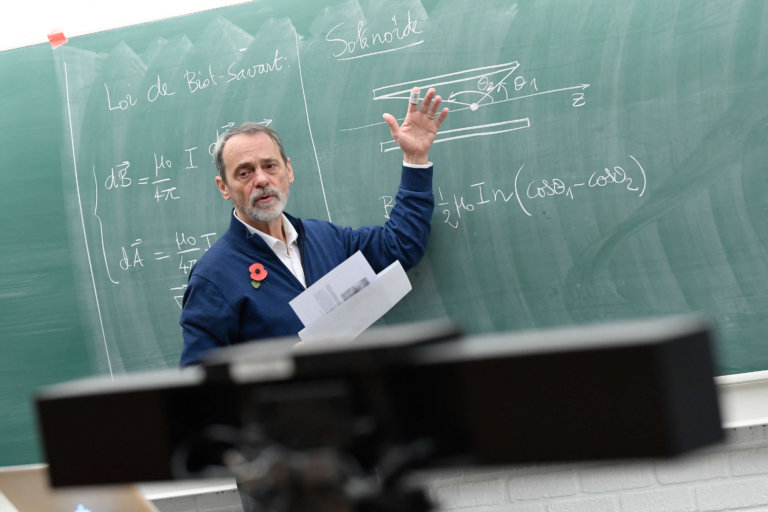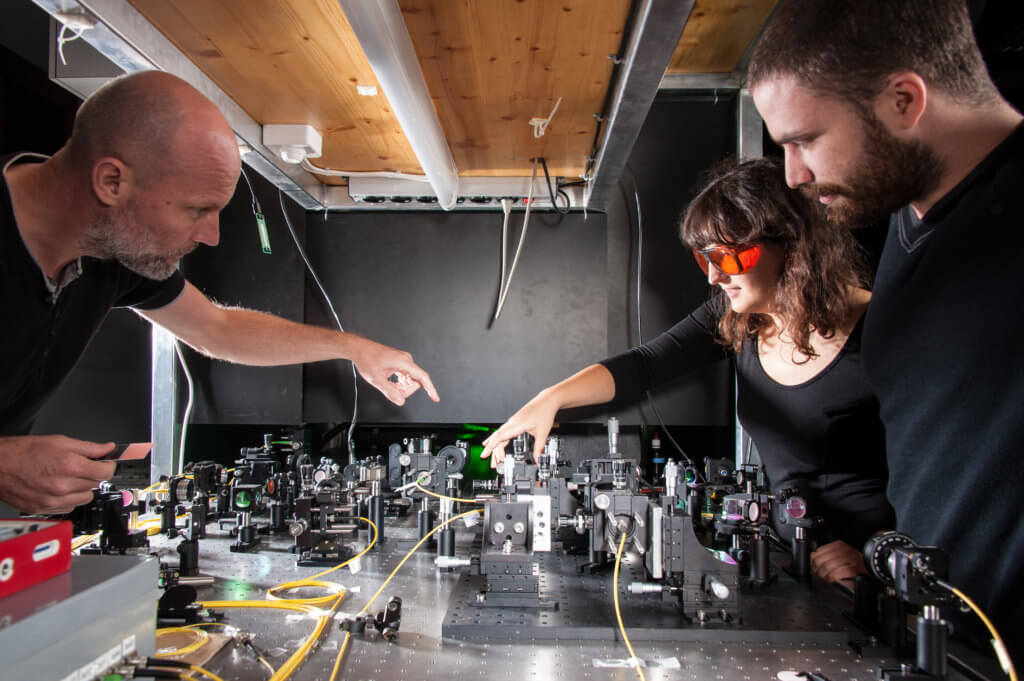
Physics is crucial to understanding the world around us, the world inside us, and the world beyond us. It is the most basic and fundamental science. This field challenges our imaginations with concepts like relativity and string theory, and it leads to great discoveries, like computers and lasers, that lead to technologies which change our lives — from healing joints to curing cancer and building a more sustainable world.
Physicists are problem solvers. Their value is evident everywhere in high-tech products and computerised communications. Many of the technological advances we have today flow directly from physics laboratories. Much of the equipment and technology used by other scientists and medical doctors were originally developed by physicists, including x-rays, and MRIs.
Students who study physics are prepared to work at the forefront of ideas in science and technology, whether they end up in academia, the government, or the private sector. Careers might focus on basic research in astrophysics, cosmology, particle physics, atomic physics, photonics or condensed matter physics, or in more applied research in areas such as renewable energy, quantum information science, materials development, biophysics, or medical physics.
Take your first step into this dynamic journey with an advanced degree from one of these top universities in Europe.
Lappeenranta-Lahti University of Technology

Source: LUT
Studying at LUT School of Engineering Science brings you to the forefront of technology and uncovers solutions to environmental problems. The distinctive LUT combination — natural sciences and expertise in engineering with numerous practical applications — opens many doors in industry and research, including opportunities to work at CERN, home of the supercollider and other scientific innovations.
What sets its Department of Physics apart from the competition is its expertise in the areas of material physics, spintronics, nanophysics and instrumentation primarily based on semiconductor and superconductor technology. If you seek advanced training specially tailored for applied and industrial research, choose the Master’s Programme in Technical Physics.
The programme focuses on properties of condensed matter — including semiconductors, superconductors, functional magnetic materials, and nanostructures such as metal organic frameworks (MOFs) — that are vital for future and existing technologies in industries such as energy, health and the environment.
By the time you graduate, you will know advanced theoretical concepts, as well as computational and experimental methods in modern physics. You will have the skills to apply the ideas you learn to new problems, perform pilot simulations and experiments to tackle new phenomena, operate experimental setups, manage data, estimate errors and uncertainties, and communicate new concepts in physics effectively.
As you become competent to work independently, familiarise with innovation and novel opportunities — in areas such as materials science, nanotechnology, healthcare, water/air purification and clean energy — you will form a professional network with top talent as well as prestigious laboratories, universities and industries around the world.
First-year students can apply to intern at CERN, the European Organisation for Nuclear Research. For three months, three of the most talented students are able to see the world’s largest and most complex scientific instruments, follow physicists and engineers probing the fundamental structure of the universe and gain clues about how particles interact and provide insights into the fundamental laws of nature. LUT students also benefit from the school’s international scientific collaboration projects involving Russian, European, American, and Japanese partners while working for example on their Master’s theses.
University of Manchester

Source: University of Manchester
Home to outstanding research, leading facilities and internationally-renowned physicists and astronomers, the University of Manchester’s Department of Physics and Astronomy prepares future leaders in both academia and industry. The department explores and addresses fundamental questions from the tiniest particles to the great cosmos as well as everything in between.
The hands-on nature of a Manchester education means students learn through lectures, interactive sessions, tutorial classes, laboratory work and workshops. The department offers a wide continuum of doctorate, master’s, and bachelor’s programmes.
If you are interested in classical physics, including dynamics, waves, electromagnetism and thermodynamics, then the MPhys Physics degree fits the bill. Course modules dive deeper into concepts such as the unification of space and time, the meaning of wave-particle duality and the relation between entropy and disorder.
Students have access to an array of facilities that rival those of leading departments across the world. They include the new 10 million pounds extension to its Schuster Laboratory as well as the world-famous Jodrell Bank Observatory.
Here, students develop their expertise in topics such as atomic and molecular structure; solid state electronic devices; electro-magnetic radiation; lasers, stars and cosmology; particle and nuclear physics; and the more advanced aspects of theoretical physics. Graduates from this programme obtain scientific, technical and computing jobs, or go on to pursue doctoral research while the others go into the commercial, financial and business sectors.
University of Geneva

The Physics Section applies the transformative power of physics to the foremost scientific problems. Source: University of Geneva
Founded in 1559, the University of Geneva is home to over 17,000 students from 150 different nationalities. It is Switzerland’s second largest university.
If you’re looking for an atmosphere that is conducive to discussion and debate and generates innovative ideas, the university’s Physics Section is the place to be. The areas of excellence in research include life sciences (molecular biology, bio-informatics), physics of elementary particles, and astrophysics.
The Physics Section applies the transformative power of physics to the foremost scientific problems; educates the next generation of leading physicists; and promotes the public understanding of physics. Students are offered a comprehensive range of specialisations, with a particular focus on new applications of fundamental physics.
These specialisations are offered at four main physics departments: Department of Applied Physics; Department of Theoretical Physics; Department of Nuclear and Corpuscular Physics; and Department of Quantum Matter Physics.
The two-year master’s programme covers a broad spectrum of courses in physics. You will receive an in-depth education in specialised areas, such as particle physics, quantum matter physics, theoretical physics, applied physics or cosmology. In addition to a solid foundation in modern physics, you will also gain an exhaustive expertise in your field of specialisation.
What’s more, there are opportunities to work at prestigious institutions such as CERN, ESA and NASA. The result? The opening of doors into careers in research as well as teaching, industry, finance and more.
KU Leuven

KU Leuven students are trained to become physicists ready to work in research institutes. Source: KU Leuven
At KU Leuven, students learn alongside top-level researchers. Known as one of Europe’s highest-ranked and most renowned universities, KU was named the most innovative university of Europe by Reuters four years in a row (2016, 2017, 2018 and 2019). How was this achieved? By developing the most important drug against HIV, a new type of solar panel that converts oxygen into hydrogen and uncovering the secrets of Sagalassos.
Here, students learn through innovative curriculum and from world-renowned experts. They benefit from the most advanced research and education facilities.
The university offers a wide array of bachelor’s, master’s and advanced master’s programmes provided by 15 faculties. For the Master of Physics programme, students develop critical awareness of current research problems and new insights at the forefront of physics. This programme allows you to specialise in areas including condensed matter physics, nuclear physics or theoretical physics.
Its structure is as follows: you start with advanced courses in different disciplines of physics for a semester. What follows is a major research undertaking, consisting of advanced and specialised courses and a master’s thesis. You can then choose from one of two options: broadening research skills (via an internship or more elective courses) or preparing for a non-academia career (through courses in entrepreneurship or an internship).
Students are trained to become physicists who are capable of working in research institutes, corporate environments or the social profit sector. This will help to prepare graduates to progress to PhD study, or to work in an industrial or other business related area.
*Some of the institutions featured in this article are commercial partners of Study International







